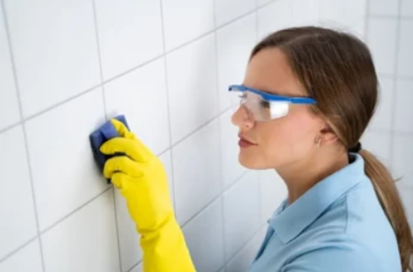
Warmer months bring on the need to fix things up around the home, both indoors and out. Whether it’s keeping your lawn under control, cleaning out the attic or working on a home repair project, your to-do list is screaming for attention. Since these are chores that often present a risk of eye injury, it’s a good idea to review some basic safety tips.
According to the American Academy of Ophthalmology, an estimated 2.4 million eye injuries occur in the United States each year. 90% of these injuries could have been prevented had the person been wearing protective eyewear.
In light of these statistics, wearing protective eyewear is one of the most important safety measures you can take when tackling your spring chores. Protective eyewear that meets industry standards will have “ANSI Z87.1” marked on the lens or frame. Eyewear of this sort can be found at most hardware stores and home supply stores like Farm and Fleet and Home Depot.
Eye protection should be used during such chores as gardening, lawn work and working with shop machinery. It’s important to know that your regular glasses don’t offer enough protection for many common tasks, particularly those that can send debris flying through the air or splash you with harmful liquids.
Here are a few things to keep in mind when doing lawn work:
- Always wear safety goggles. Flying debris is one of the most common causes of eye injuries. Goggles will also keep you safe while preparing for yard work, especially around chemicals such as gasoline, battery acid and detergents.
- If you have low vision, set up visible markers or use trees, shrubs or other landmarks to section off your lawn and help you remain oriented to the mowing space.
- Make sure spray bottles are pointed away from you and be aware of any breeze.
- Use protective techniques to protect your head, face and eyes from injury when bending over your lawn work.
- Always turn off your lawn mower before cleaning out clogs or clearing obstacles in your path.
- When working around trees, stay alert for branches and twigs that could poke you in the eye.
In addition to protecting your eyes, it’s smart to protect the rest of you as well:
- Wear long pants and sleeves to protect your legs from flying debris, branches and insects.
- Wear sturdy shoes with closed toes.
- Before starting your lawnmower, prepare your work area by removing obstacles such as toys, loose plants, rocks and branches. All of these objects have the potential to become projectiles that could injure you or somebody else who is nearby.
Indoor chores also can present risks. Here are some indoor eye safety tips:
- Bleach and other cleansers can be harmful. Safety goggles will protect you from these agents.
- Provide good lighting in stairways and other areas around the house that may be easy to stumble in.
- Never mix detergents and other chemical agents and stay in well-ventilated areas when using chemicals.
- Follow manufacturers’ directions for safe handling of cleaning supplies.
- Be aware that screws, nails, and fragments of wood, drywall or paint can be launched into the air. Safety goggles will ensure that they don’t end up in your eye.
While we’ve mostly discussed protecting your eyes from dust, chemicals and foreign objects, there’s another potential danger to be aware of when working outdoors during the summer: Your eyes can also be damaged by the sun! The Sharper Vision Store carries a wide range of sunglasses that can help protect your vision from the sun’s harmful rays.
Finally, while it might be tempting to treat a seemingly minor eye injury yourself or take a “wait and see” approach, you should always seek medical attention after an accident involving your eyes.

